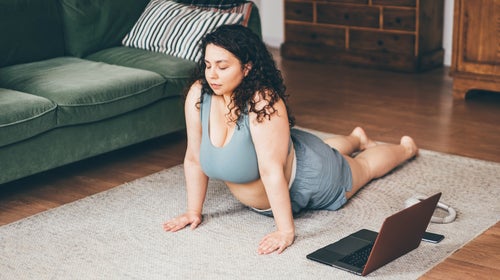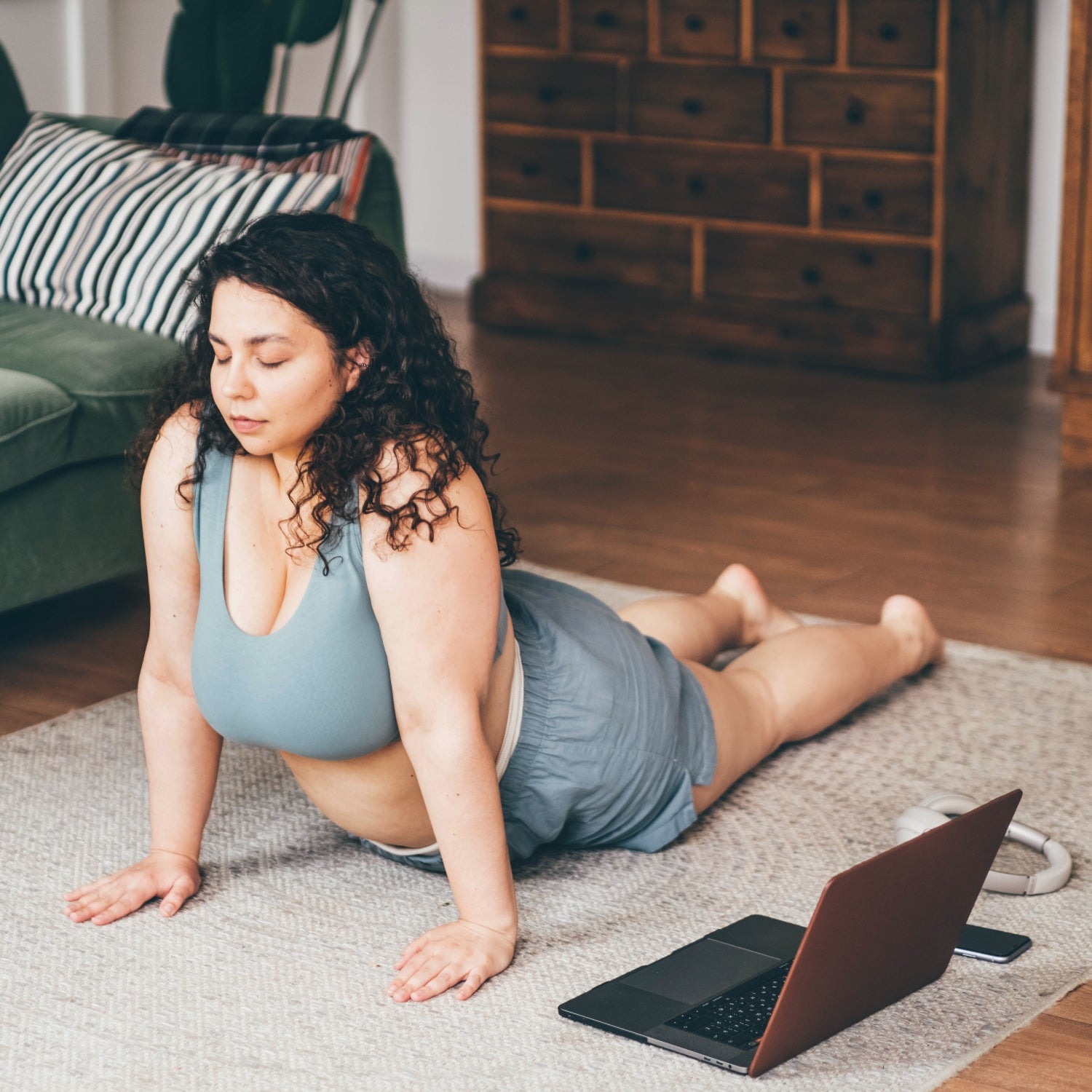I walked into my first yoga class at the Y a few Friday evenings ago, feeling nervous and intrigued. Usually, I’m not one for an evening workout class on the weekend—I’d rather eat takeout and catch up on my favorite shows in bed, or hang out with friends—but I felt a random urge to go. I needed a calm way to end an otherwise stressful week.
I wasn’t sure what to expect. During my past experiences at studios, I experienced physical pain during class. However, yoga is something my friends and dietitian recommend for improving my mental health and being in tune with my body. I decided to give the practice another shot.
I went alone, like I usually do. It’s easier than trying to make plans, especially at the last minute, and working out with people I know can make me feel watched and self-conscious.
When the class began, my teacher, Jody, told us to sit in a relaxed position, feel the grounding of our bodies, and breathe deeply. I found her gentle voice to be instantly calming. As we moved through each pose, she offered prop-assisted variations and encouraged us not to judge ourselves.
I knew I was in the right place.
I was able to settle into each pose in a way that felt comfortable (enough) while taking deep breaths—in through the nose, out through the mouth. Focusing on my breath helped me not think of all of the stressors in my life, a much-needed game-changer. As I did this, I found myself thinking: look at these cool things my body can do.
This idea felt revolutionary. Considering I’m someone who has struggled with body image and comparing myself to others for years, this newfound appreciation of my body was a big deal. Ever since I was a kid, I remember looking at my friends’ bodies and judging mine for being bigger. This was exacerbated by the fact I’m no stranger to those (horrible, horrible) articles with headlines that brazenly compare celeb body sizes. I’ve strived to be one of the better (if not best) participants in any activity, whether that’s dance, volleyball, or something else, and I feel insecure if I’m not.
But ever since my first year of college, when I joined , a social justice-based eating disorder organization, my relationship with my body has been changing. The refrains we learned, while a bit fuzzy, still echo in my head: all bodies are good bodies, and our value isn’t in what we look like.
In just a few short weeks, I’ve found that yoga helps me get into that mindset because it allows me to appreciate my body without putting too much emphasis on it.
How Yoga Can Help with Body Image
Curious about this experience with yoga, I reached out to teachers and therapists to explore yoga’s impact on your relationship with your body. (With this, I need to acknowledge my privilege as an able-bodied person.)
Yoga can help you experience your body differently “by increasing flexibility over time, gaining more confidence in how your body can move through yoga poses, and practicing with the intentions of improving the relationship you have with yourself,” says Victoria Mengel, a creative arts therapist and primary therapist at , a residential eating disorder facility.
My body hasn’t done yoga for long; she’s still learning, and that’s OK. She’s a tool, a shell, not something that needs to look a certain way. I want to see what she can do and honor that limit.
Several studies suggest that yoga can help your relationship with your body. A found that young adults who practice yoga experience increased gratitude for their body. The same study found that participants felt more accomplished and confident in their yoga practice, especially in classes with diverse bodies. Additionally, a published in the Psychology of Women Quarterly discovered that women who participate in yoga are more aware and responsive to bodily sensations. They also experience lower levels of self-objectification and greater body satisfaction.
How to Improve Your Relationship with Your Body During Yoga
If you worry a yoga class will worsen your body image struggles (especially with all of those tight leggings and workout tops), I hear you. The following tips can help.
Try Different Classes and Find What Works for You
Mengel suggests trying different kinds of yoga and sticking to ones that feel the best physically and mentally. She suggests that Yin yoga or restorative yoga may be a good place to start.
Location also matters. You can practice in a studio, park, or your bedroom—basically, wherever you feel the most comfortable, she says.
Set Your Intention
Before you move into your yoga practice, your teacher may mention “setting an intention.” This is another great way to focus on body love. a yoga teacher with a master’s in mental health counseling and marriage and family therapy, suggests an intention like: Today, I’m going to treat myself with love and respect, and I’m going to honor my body. If you slip up—like judging yourself for falling out of a pose or you find yourself comparing your body to someone else’s—that’s OK. Try to give yourself some grace.
Pay Attention to Your Thoughts
Your mind may wander throughout yoga—it certainly does for me—and that’s totally normal. Take this opportunity to notice what you’re thinking and how those thoughts could be more helpful. “By practicing this skill (non-judgmentally, I might add), we practice the ability to pay attention, which is a central skill in helping with body image,” says , a psychotherapist and yoga teacher. Being able to notice negative body thoughts is the first step toward changing them.
Engage in Compassionate Self-Talk
Once you’ve noticed any unhelpful thoughts, think about how to reframe them. Or, alternatively, try to be more intentional about thinking positive thoughts first. During my practice, I like to repeat affirmations with each deep breath, such as: My body is my friend or I am loved.
Focus on Your Own Practice
If you notice thoughts of comparison popping up, it can be helpful to remember that people aren’t watching you—they’re focused on themselves.
“It is important to leave the ego out of the yoga practice,” says , a yoga teacher. She recommends closing your eyes during poses so you won’t be tempted to compare yourself.
Celebrate What Your Body Can Do
You may struggle to do or hold certain poses (been there, done that), and there’s no shame there. Your value isn’t dependent on your abilities. But at the same time, it’s also OK to celebrate what your body can do (which may or may not change over time).“We’re all on our own paths, and we should celebrate our uniqueness,” Sprintis says. “Your yoga practice belongs to you, which means there’s no scoreboard or competition.”
Establish a Friendship with Your Body
“Our bodies are the most incredible machines on this planet, and when we are able to shift our mindset and release unrealistic expectations of how we ‘should’ look, we can learn to treat our body as our home, with unconditional love and acceptance,” says Cat Meffan, a yoga teacher and the founder of , a digital yoga class library. “Bring love, compassion, and gratitude to your body in your practice, and you will start to feel and experience a shift.”
Try to keep those feelings top of mind throughout your entire yoga practice—even when it ends, in Savasana ()—because a body at rest is worthy of appreciation and love, too.
In that Friday yoga class, I realized my body is my friend. She helps me move into different, interesting poses. She works her hardest to meet my requests and keep me healthy. She’ll be with me for my whole life. I want to treat her with the same level of respect she shows me.
And when my version of a pose looks different from someone else’s, that’s just it—it’s different, not worse or shameful or wrong. My body hasn’t done yoga for long; she’s still learning, and that’s OK. She’s a tool, a shell, not something that needs to look a certain way. I want to see what she can do and honor that limit.
I still struggle with comparison and gratitude sometimes. I wish my body were smaller and more flexible. I judge myself when I can’t do the harder poses. In these moments, I try to focus on Jody’s voice saying “no judgment.” That is the energy I want to harness moving forward in yoga and in life.
Ashley Broadwater is a freelance writer who focuses on health and relationships. Passionate about intersectional body positivity, mental health, and sexual health, she aims to help others have a positive relationship with their bodies, themselves, and other people. Her previous work has been featured in HuffPost, Men’s Health, POPSUGAR, Well+Good, and other publications. A graduate of the Hussman School of Journalism and Media at UNC-Chapel Hill, she now lives in the Raleigh area.
Want more �����ԹϺ��� health stories? .


